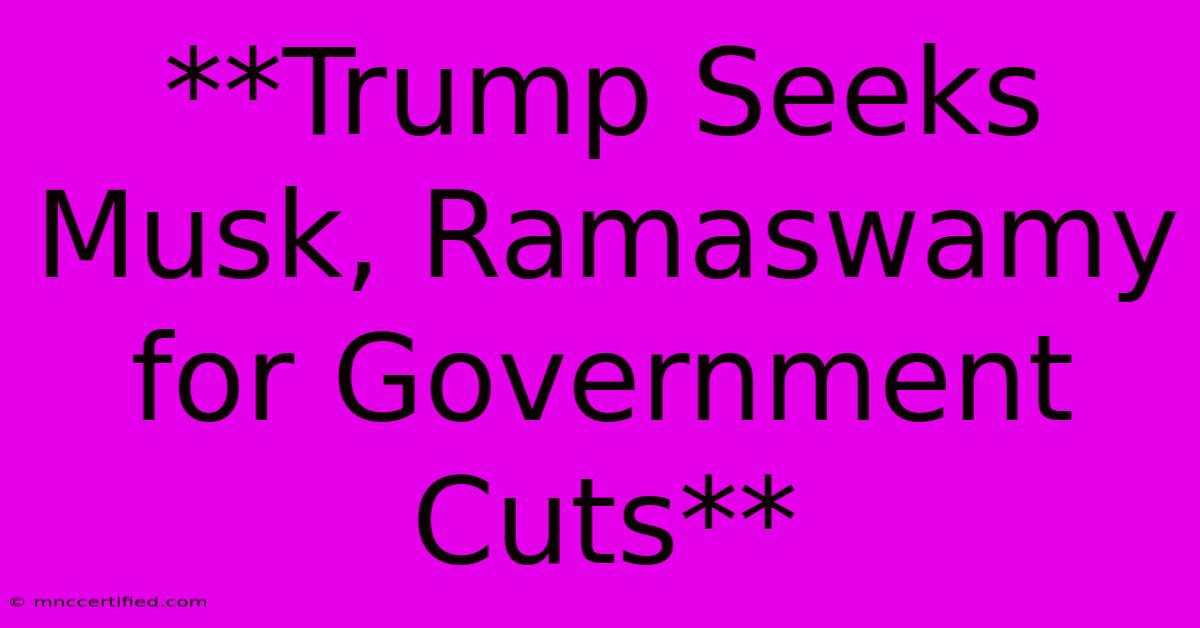**Trump Seeks Musk, Ramaswamy For Government Cuts**

Table of Contents
Trump Seeks Musk, Ramaswamy for Government Cuts: A Controversial Proposal
Former President Donald Trump has sparked controversy by proposing that tech mogul Elon Musk and entrepreneur Vivek Ramaswamy head a task force to drastically cut government spending. This bold move has ignited debate, with proponents touting its potential for efficiency and critics warning of potential consequences for crucial services.
The Proposal: A New Approach to Government Spending
Trump's proposal, outlined in a recent statement, aims to tackle the growing national debt by slashing government expenditures. He envisions a task force led by Musk, known for his ambitious projects and unconventional approaches, and Ramaswamy, who gained notoriety for his outspoken views on economic policy.
The task force would be tasked with identifying and eliminating "wasteful" government programs and inefficiencies. This initiative, Trump claims, would "unlock unprecedented economic growth" and ensure a brighter future for America.
Potential Benefits: Streamlining Government and Boosting Efficiency
Supporters of Trump's proposal highlight the potential benefits of streamlining government operations. They argue that a task force led by successful business leaders like Musk and Ramaswamy could bring a fresh perspective and introduce innovative approaches to tackling government waste. By eliminating redundant programs and streamlining processes, they contend, the task force could free up valuable resources for other critical initiatives.
Additionally, proponents believe that the focus on efficiency could lead to a more responsive and agile government, better positioned to adapt to changing economic realities. This, they argue, would benefit both businesses and individual citizens alike.
Concerns and Criticism: Risks to Crucial Services and Potential for Unintended Consequences
Critics of Trump's proposal express serious concerns about its potential impact on crucial services. They warn that a focus on drastic cuts could lead to reductions in vital programs such as Medicare, Medicaid, and Social Security, impacting vulnerable populations.
Furthermore, critics argue that the lack of transparency and potential for political influence within the task force could lead to arbitrary cuts that disproportionately affect specific groups. They emphasize the need for careful consideration and public input in the process of evaluating and reforming government programs.
Conclusion: A Controversial Proposal with Potential for Both Positive and Negative Outcomes
Trump's proposal to establish a task force led by Musk and Ramaswamy to cut government spending presents a complex and controversial issue. While proponents see it as a necessary step towards fiscal responsibility and economic growth, critics warn of potential risks to vital programs and vulnerable populations.
Ultimately, the success or failure of this initiative will depend on its implementation, transparency, and the willingness of all stakeholders to engage in constructive dialogue and consider the potential consequences of drastic cuts. The debate surrounding this proposal is likely to continue, as it raises fundamental questions about the role of government in a modern economy and the balance between fiscal responsibility and the needs of the people.

Thank you for visiting our website wich cover about **Trump Seeks Musk, Ramaswamy For Government Cuts**. We hope the information provided has been useful to you. Feel free to contact us if you have any questions or need further assistance. See you next time and dont miss to bookmark.
Featured Posts
-
Second Trump Term Higher Education Landscape
Nov 13, 2024
-
Fc Cincinnatis Marco Angulo Dies At 22
Nov 13, 2024
-
Doves Announce 2025 Constellations Tour
Nov 13, 2024
-
Pitbull 2025 Ireland Concert Get Your Tickets
Nov 13, 2024
-
Fc Cincinnati Player Dies From Injuries
Nov 13, 2024